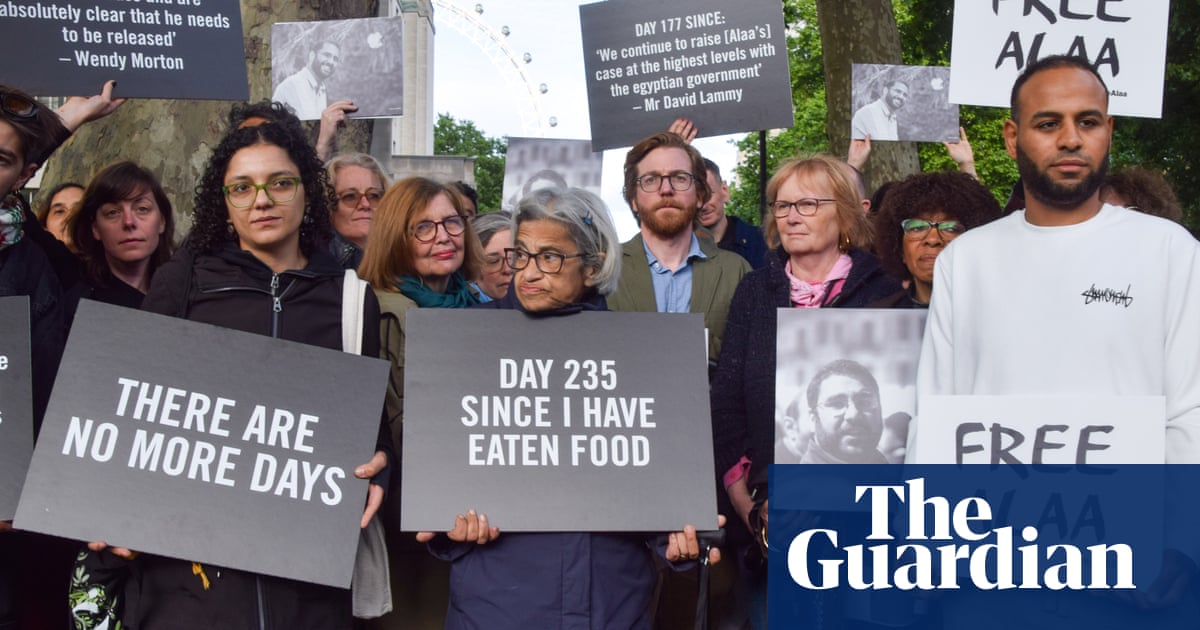The Britsh-Egyptian human rights activist and writer Alaa Abd el-Fattah is being illegally detained by the Egyptian government, an independent UN panel has found after an 18-month investigation.
He is being held in a Cairo jail while his mother, Laila Soueif, based in Britain, ison hunger strike. She is holding a daily one-hour vigil outside Downing Street, the limit her health and weight loss allows. She is on day 241 of the hunger strike, and her body weight has halved.
Keir Starmer, the UK prime minister, last week called for a second time for the Egyptian president, Abdel Fatah al-Sisi, to show clemency, saying the Egyptian government was causing the family great anguish.
In a report released to the family, the UN working group on arbitrary detention also asked the Egyptian government “to take the steps necessary to remedy the situation without delay”, adding “the appropriate remedy would be to release Abd el-Fattah immediately and accord him an enforceable right to compensation and other reparations, in accordance with international law”.
Unusually, the Egyptian government mounted a full defence of its actions to the UN panel. The UN group gave a withering verdict on the standards of justice in Egypt, including the suppression of free speech.
It concluded that the activist’s continued imprisonment was arbitrary and illegal owing to the absence of a warrant at the time of his arrest and the lack of explanation of reasons for his arrest or the allegations against him. It found Fattah was arrested for exercising his freedom of expression, not afforded a fair trial, and was detained based on his political views.
Egypt is not obliged to comply with the report, but its findings add to the damage being done to the country’s reputation by continuing to detain one of it most prominent writers.
Fattah was arrested in September 2019, and was finally sentenced in December 2021 to five years in jail for spreading false news and harming Egypt’s national interest. The UN panel found the allegation stemmed from Fattah sharing a Facebook post about the death of a prison inmate.
Fattah’s English barrister, Can Yeğinsu, said: “The UN working group has delivered a clear and unequivocal decision: Alaa Abd el-Fattah’s detention is arbitrary and in breach of international law. Egypt is now obligated to release Alaa immediately.”
Richard Ratcliffe, the husband of Nazanin Zaghari-Ratcliffe, the British-Iranian held in a Tehran jail for five years, said: “Having a ruling from the working group of arbitrary detention is a club no family wants to belong to. You worry repeatedly about whether to file, and then the UN system is so slow, so you can wait for years. Then when it comes, it is a moment of clarity – an acknowledgment of the injustice under international law.
“The crime is not Alaa’s; the criminals are those still holding him, and provoking his family to desperation. For our family, our WGAD ruling was also a relief: we thought it would mark an end to the UK government’s prevarication, and the beginning of firm action on Nazanin’s case. In the end, it did.
“But for Alaa’s family, time is so much shorter. The ruling needs to be implemented now. The law is clear, but so is the heavy cost of continuing to ignore it.”
Fattah’s cousin Omar Robert Hamilton urged the UK to take Egypt to the international court of justice over the detention.
The working group in its report said the use of excessively broad and vague concepts such as “dissemination of false information” were incompatible with international standards of freedom of expression and should be abolished.
It also suggested it was a crime against humanity to use “rotation sentencing”, whereby the prosecution changes the original charge so that the defendant’s period in pre-trial custody is not counted as part of the sentence.
